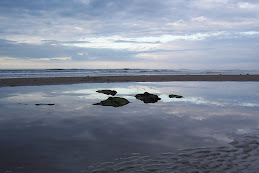Reflections while co-facilitating a residential workshop at Cober Hill:
The power of the word, the pen writing the word, why is it so unexpected? Visual art, music and dance can surely be as impactful? Is it the ordinariness of writing which makes its power extraordinary and startling and terrifying?
We meet ourselves in painting, sculpture and dance too, but, perhaps, we sign up more consciously for that - by taking up a special instrument or going to a demarcated space such as a studio or a dance floor?
Tuesday
Wednesday
I have been watching Faulk on Fiction (BBC2, Saturdays, 9pm, part of the BBC's season of programmes leading up to World Book Day in March). I did note, on his first outing, SF did not mention any female writers, though since he has some in the coming three episodes, maybe I can forgive him.
The hero is dead, he says, at least in the modern literary novel. I am continually fascinated at how literature follows society following literature. The novel is the mirror, but, in seeing itself, society - or the individual - is transfigured. So have we come to a place, perhaps, where heroes are no longer welcome?
It is also interesting how great creative explosions are also dependent the more prosaic. Van Gough needed the development of the paint which could convey his imagination. Novels required the printing press, higher levels of literacy, people who saw a business opportunity in bringing bound pages of tales to the masses. What will the invention of our age, the internet, ultimately mean?
And when the oil which turns the turbines which creates the electricity which lights our computer screens runs out, how will we tell our stories then?
The hero is dead, he says, at least in the modern literary novel. I am continually fascinated at how literature follows society following literature. The novel is the mirror, but, in seeing itself, society - or the individual - is transfigured. So have we come to a place, perhaps, where heroes are no longer welcome?
It is also interesting how great creative explosions are also dependent the more prosaic. Van Gough needed the development of the paint which could convey his imagination. Novels required the printing press, higher levels of literacy, people who saw a business opportunity in bringing bound pages of tales to the masses. What will the invention of our age, the internet, ultimately mean?
And when the oil which turns the turbines which creates the electricity which lights our computer screens runs out, how will we tell our stories then?
Tuesday
I am watching a news report from a war zone. A soldier crouches over a rifle, there is a gentle 'phut', no more than the final breath escaping from a balloon. The journalist tells us this soldier has just killed a man.
It is an explanation which we need because the soldiers talk about a 'target down' and having 'dropped him'. It all reminds me of the the over-used, 'collateral damage'.
I wonder at how language can take us so far from the act. And at the seemingly innocent sound of a gun.
It is an explanation which we need because the soldiers talk about a 'target down' and having 'dropped him'. It all reminds me of the the over-used, 'collateral damage'.
I wonder at how language can take us so far from the act. And at the seemingly innocent sound of a gun.
Subscribe to:
Comments (Atom)

